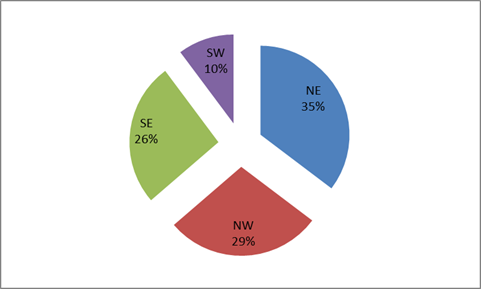Passing Counterfeit Bills
The reporting of counterfeit currency is trending upwards this year in Calgary and it is believed that the driving force behind the month to month growth relates to the passing of one particular counterfeit $100.
There are nearly 130 occurrences involving a specific serial number to date in Calgary alone, and this accounts for a value of close to $50,000. More recent reporting suggests that this counterfeit $100 is being increasingly uttered with a counterfeit $20.
Despite multiple arrests in relation to this matter, reports from victims continue. Premise types repeatedly targeted (excluding company names):
- Grocery stores
- Gas stations
- Liquor stores
- Big-box discount stores
- Internet buy/sell meets
Percentage of a Particular Counterfeit $100 passed by Quadrant (2018 YTD).

Police would like to remind the public to be aware and verify the authenticity anytime they receive a bank note. For the $100 Canadian Polymer note some security features are:
- Feel the raised ink on the large $100 number
- Look at the frosted maple leaf window to see its transparent outline
- Feel the raised ink on the words “Banque du Canada” and “Bank of Canada”
- Look at the numbers that match the note’s value and at the word “Canada” that feels slightly raised.
- Look at the metallic portrait, it matches the large portrait. Tilt to see it change colour. Flip to see it on the other side.
- Look for maple leaves that border and cross into the large window.
For specifics on the Polymer notes security features please refer to the Bank of Canada webpage.
Terrorism
Signs of Radicalization
Many people gravitate toward extremist groups for many of the same reasons people join gangs and cults: their lives are missing something, and these groups help fill that void.
Observing one or more of these behaviours does not necessarily mean that they are becoming radicalized. Even if it is not directly related to terrorism, other things such as depression may be occurring, in which case it is also important to try and get them the help they need.
Below is a list of some of the most common reasons people join extremist groups which you can provide tips on:
– that they feel ostracized by their peers and are looking for a place to belong
– they are searching for their own identity and believe that they will find it by joining these group
– they are simply looking for a new thrill or source of excitement
– they want to go out and correct a perceived injustice
– they already believe a less extreme version of the religion or ideology, but become influenced by an authority figure or someone they look up to who has a more extreme doctrine
– suddenly becoming much more political or religious
– dressing differently or changing their appearance in a specific way
– surrounding themselves with a new group of friends and ignoring old ones
– becoming disinterested in school or old hobbies
– becoming more socially isolated
– suddenly approving of the use of violence to support a cause
– believing that anyone who does not support their beliefs as less than
– arguing and fighting with friends and family members more often
– spending a lot more time on the internet and/or social media
– visiting extremist websites
– starting to show sympathy towards extremist groups
– displaying intolerant and discriminatory behaviour towards people of other races, ethnicities, etc
Discovering what is really going on can be a difficult task, but if they are talking to extremists or beginning the process of radicalization, it’s important to know these warning signs and red flag behaviours as it is the first step in leading them away from radicalization.
Reporting these signs to Crime Stoppers will mean the information is passed on to Police anonymously, and they will then be able to assess the situation, and provide assistance to the individual.
